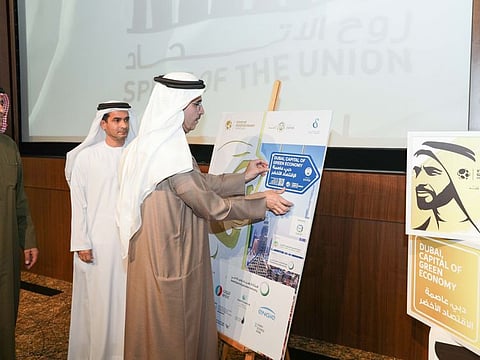Dubai to exceed clean energy target output of 7%
Dubai poised to generate more than 8% of its total power output from clean energy by 2020

Dubai: More than 8 per cent of Dubai’s total power output will be generated from clean energy by next year, exceeding the earlier set target of seven per cent, a senior official said.
This projection is based on the Dubai Clean Energy Strategy 2050, launched by His Highness Shaikh Mohammad Bin Rashid Al Maktoum, Vice-President and Prime Minister of the UAE and Ruler of Dubai, to generate seven per cent of Dubai’s total power output from clean energy by 2020, 25 per cent by 2030 and 75 per cent by 2050.
“By 2020, we will reach over 8 per cent. We actually targeted 7 per cent of Dubai’s total power to come from renewables. That means that we are ahead of the programme and that’s about 1,000 megawatts,” Saeed Mohammad Al Tayer, Managing Director and CEO of Dubai Electricity and Water Authority, said during the launch of the fifth State of Green Economy Report on Wednesday.
The report was launched by the Dubai Supreme Council of Energy in cooperation with the Dubai Carbon Centre of Excellence (Dubai Carbon) under the patronage of Dewa as a platform to showcase the efforts of key players and best practices in the area of green economy.
It was launched under the theme of the Year of Zayed and focuses on the achievements and efforts of a large number of organisations during the Year of Zayed.
Exceeding the set target for 2020 was made possible through the various initiatives of Dewa, including the Shams Dubai, which encourages households and building owners to install solar panels on their rooftops to generate electricity.
The Shams Dubai initiative has so far achieved about 70MW.
As of March 2018, Al Tayer said, of the total 10,200MW capacity of Dubai, some two per cent or 213MW is being produced from solar. This is expected to dramatically rise once the Mohammad Bin Rashid Solar Park is fully operational by fourth quarter of 2020.
Etihad Esco’s project to install solar panels on 5,000 Emirati homes as part of the goals of the eight principles of governance and the 50-Year charter launched by Shaikh Mohammad earlier this month will also help achieve the target.
Retrofitting these 5,000 villas and making them self-sustaining will drive the cost of solar further down similar to what the Safaqat programme achieved in 2017, Ivano Ianeli, CEO of Dubai Carbon, said. The Safaqat programme is a turn-key solar kit in a box that was used to green the more than 1,000 villas in Hatta.
“Through Safaqat, they were able to standardise a kit and this standardisation brought the price by half from Dh50,000. Imagine now with 5,000 villas, we will see another dramatic decrease in price,” Ianelli said.
Currently, Dubai has a “handful of solar-powered homes of probably 100 to 200 at most”, Ianelli said. The target by 2020 is to install solar panels on around 10 per cent of the occupied villas in the emirate.



